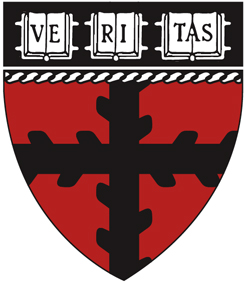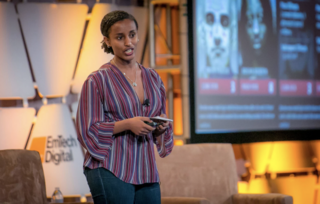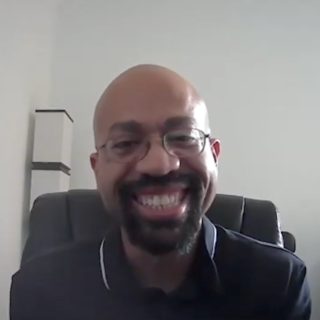Related Research Articles
The Harvard Faculty of Arts and Sciences (FAS) is the largest of the ten faculties that constitute Harvard University.
The Berkman Klein Center for Internet & Society is a research center at Harvard University that focuses on the study of cyberspace. Founded at Harvard Law School, the center traditionally focused on internet-related legal issues. On May 15, 2008, the center was elevated to an interfaculty initiative of Harvard University as a whole. It is named after the Berkman family. On July 5, 2016, the center added "Klein" to its name following a gift of $15 million from Michael R. Klein.
Michael D. Smith is the John H. Finley, Jr. Professor of Engineering and Applied Sciences in the Harvard John A. Paulson School of Engineering and Applied Sciences. He is also a Harvard University Distinguished Service Professor and served as the Dean of the Faculty of Arts and Sciences at Harvard University from 2007 to 2018. In addition to his academic position, Smith was the Chief Scientist and co-founder of Liquid Machines, Inc., a provider of enterprise rights management software.

The Harvard John A. Paulson School of Engineering and Applied Sciences (SEAS) is the engineering school within Harvard University's Faculty of Arts and Sciences, offering degrees in engineering and applied sciences to graduate students admitted directly to SEAS, and to undergraduates admitted first to Harvard College. Previously the Lawrence Scientific School and then the Division of Engineering and Applied Sciences, the Paulson School assumed its current structure in 2007. Francis J. Doyle III has been its dean since 2015.

Harry Roy Lewis is an American computer scientist, mathematician, and university administrator known for his research in computational logic, textbooks in theoretical computer science, and writings on computing, higher education, and technology. He is Gordon McKay Research Professor of Computer Science at Harvard University, and was Dean of Harvard College from 1995 to 2003.
John Gregory Morrisett is the Jack and Rilla Neafsey Dean and Vice Provost of Cornell Tech. He previously was Dean of the Faculty of Computing and Information Science at Cornell University. Morrisett was the Allen B. Cutting Professor of Computer Science in the Harvard School of Engineering and Applied Sciences prior to his position at Cornell.

Cynthia Dwork is an American computer scientist best known for her contributions to cryptography, distributed computing, and algorithmic fairness. She is one of the inventors of differential privacy and proof-of-work.

Cherry A. Murray, Ph.D., is a Professor of Physics and the Director of the Biosphere2 Institute at the University of Arizona at Tucson. She is the Benjamin Peirce Professor of Technology and Public Policy emerita at, and former dean of, the Harvard School of Engineering and Applied Sciences (SEAS).

Milind Tambe is an Indian-American educator serving as Professor of Computer Science at Harvard University. He also serves as the director of Center for Research on Computation and Society at Harvard University and the director of "AI for Social Good" at Google Research India.

Chinedum Osuji is the Eduardo D. Glandt Presidential Professor and the departmental chair of chemical and biomolecular engineering (CBE) at University of Pennsylvania. He is also a former Taekwondo Olympian and represented Trinidad and Tobago. His laboratory works on polymers and soft materials for functional application including liquid filtration. He is the associate editor of the journal Macromolecules.

Harvard University's Collection of Historical Scientific Instruments (CHSI), established 1948, is "one of the three largest university collections of its kind in the world". Waywiser, the online catalog of the collection, lists over 60% of the collection's 20,000 objects as of 2014. The collection was originally curated by Mr. David P Wheatland in his office to prevent obsolete equipment from being cannibalized for its component parts and materials.
Francis "Frank" J. Doyle III is an American engineer and academic administrator. He is the dean of the Harvard John A. Paulson School of Engineering and Applied Sciences and the John A. and Elizabeth S. Armstrong Professor of Engineering and Applied Sciences. Doyle is also affiliated with the Division of Sleep Medicine of Harvard Medical School. On December 15, 2022, it was announced that Doyle will serve as the 14th provost of Brown University starting in the 2023 academic year.
Jim Waldo is an American computer scientist and the Chief Technology Officer of Harvard University. He is the Gordon McKay Professor of the Practice of Computer Science at the Harvard School of Engineering and Applied Sciences and Professor of Technology and Policy at the Harvard Kennedy School. Previously he was a Distinguished Engineer at Sun Microsystems Laboratories, where he was lead architect for Jini, a distributed programming system based on Java, and helped develop Project Darkstar. He was also involved in some of the early design and development of the Java programming language and environment.

Kathy Pham is a Vietnamese American computer scientist and product management executive. She has held roles in leadership, engineering, product management, and data science at Google, IBM, the Georgia Tech Research Institute, Harris Healthcare, and served as a founding product and engineering member of the United States Digital Service (USDS) in the Executive Office of the President of the United States at The White House. In 2021, Pham was named the Deputy Chief Technology Officer of the Federal Trade Commission.

Samer Hassan is a computer scientist, social scientist, activist and researcher, focused on the use of decentralized technologies to support commons-based collaboration. He is Associate Professor at Universidad Complutense de Madrid (Spain) and Faculty Associate at the Berkman Klein Center for Internet & Society at Harvard University. He is the recipient of an ERC Grant of 1.5M€ with the P2P Models project, to research blockchain-based decentralized autonomous organizations for the collaborative economy.

Finale Doshi-Velez is a computer scientist and the John L. Loeb Professor of Engineering and Applied Sciences at Harvard University. She works on machine learning, computational statistics and healthcare.

Rediet Abebe is an Ethiopian computer scientist working in algorithms and artificial intelligence. She is an assistant professor of computer science at the University of California, Berkeley. Previously, she was a Junior Fellow at the Harvard Society of Fellows.

James W. Mickens is an American computer scientist and the Gordon McKay Professor of Computer Science at Harvard John A. Paulson School of Engineering and Applied Sciences at Harvard University. His research focuses on distributed systems, such as large-scale services and ways to make them more secure. He is critical of machine learning as a boilerplate solution to most outstanding computational problems.
Carol Lynn Alpert is an American science communication and public engagement expert and the Director of Strategic Projects at the Museum of Science (MOS). She is also an Associate in Applied Physics in the John A. Paulson School of Engineering and Applied Sciences at Harvard University and Co-Director of the NSF Center for Integrated Quantum Materials.

Prineha Narang is an American physicist and computational material scientist. She is a Professor of Physical Sciences and Howard Reiss Chair at the University of California, Los Angeles (UCLA). Narang currently serves as a U.S. Science Envoy approved by the Secretary of State to identify opportunities for science and technology cooperation. Before moving to UCLA, she was first an Environmental Fellow at Harvard University Center for the Environment and then an Assistant Professor in the John A. Paulson School of Engineering and Applied Sciences at Harvard University. Narang’s work has been recognized internationally by many awards and a variety of special designations, including the Mildred Dresselhaus Prize, the 2021 IUPAP Young Scientist Prize in Computational Physics, a Friedrich Wilhelm Bessel Research Award from the Alexander von Humboldt Foundation, and a Max Planck Sabbatical Award from the Max Planck Society. Narang also received a National Science Foundation CAREER Award in 2020, was named a Moore Inventor Fellow by the Gordon and Betty Moore Foundation for the development for a fundamentally new strategy for single molecule sensing and environmental toxin metrology using picoscale quantum sensors, CIFAR Azrieli Global Scholar by the Canadian Institute for Advanced Research, and a Top Innovator by MIT Tech Review. Narang was awarded a Guggenheim Fellowship in 2023.
References
- ↑ "Changing the world through technology | Harvard John A. Paulson School of Engineering and Applied Sciences". www.seas.harvard.edu. Retrieved 2020-02-09.
- ↑ Mahmoody, Mohammad; Moran, Tal; Vadhan, Salil (2011). "Time-Lock Puzzles in the Random Oracle Model". In Rogaway, Phillip (ed.). Advances in Cryptology – CRYPTO 2011. Lecture Notes in Computer Science. Vol. 6841. Berlin, Heidelberg: Springer. pp. 39–50. doi: 10.1007/978-3-642-22792-9_3 . ISBN 978-3-642-22792-9.
- ↑ SEAS, Harvard (2015-11-23). "Trusting the system: Innovations for an insecure world". Medium. Retrieved 2020-02-09.
- ↑ Jones, Rachael. "Research positions at the Privacy Tools Project at the Center for Research on Computation and Society (CRCS)". UNC Center for Media Law and Policy. Retrieved 2020-02-09.
- ↑ "Harvard University Privacy Tools Project". privacytools.seas.harvard.edu. Retrieved 2020-02-09.
- ↑ "Michael Mitzenmacher and Stuart Shieber named 2014 ACM Fellows | Harvard John A. Paulson School of Engineering and Applied Sciences". www.seas.harvard.edu. Retrieved 2020-02-09.
- ↑ "Stuart Shieber | Berkman Klein Center". cyber.harvard.edu. 2019-03-29. Retrieved 2020-02-09.
- ↑ "Brown CS: Distinguished Lecture". cs.brown.edu. Retrieved 2020-02-09.
- ↑ "Greg Morrisett named dean of Cornell Tech". Cornell Chronicle. Retrieved 2020-02-09.
- ↑ SEAS, Harvard (2015-11-23). "Trusting the system: Innovations for an insecure world". Medium. Retrieved 2020-02-09.
- ↑ "Margo Seltzer named director of Center for Research on Computation and Society | Harvard John A. Paulson School of Engineering and Applied Sciences". www.seas.harvard.edu. Retrieved 2020-02-09.
- ↑ "New Computer Science Professor Milind Tambe Aims for Social Impact | News | The Harvard Crimson". www.thecrimson.com. Retrieved 2020-02-09.
- ↑ Ardia, David. "Harvard CRCS Call for Postdoctoral fellows + Visiting Scholars for 2016-2017". UNC Center for Media Law and Policy. Retrieved 2020-02-09.
- ↑ "Apply". crcs.seas.harvard.edu. Retrieved 2020-02-09.
- ↑ "Harvard's CRCS". YouTube. Retrieved 2020-02-09.
- ↑ "CRCS Lunch Seminar: Susan Crawford". crcs.seas.harvard.edu. Retrieved 2020-02-09.
- ↑ "Bruce Schneier: "The NSA, Snowden, and Surveillance"". crcs.seas.harvard.edu. Retrieved 2020-02-09.
- ↑ "Megan Price: "How Machine Learning Helps Count Casualties in Syria"". crcs.seas.harvard.edu. Retrieved 2020-02-09.
- ↑ "Teeing up collaboration | Harvard John A. Paulson School of Engineering and Applied Sciences". www.seas.harvard.edu. Retrieved 2020-02-09.
- ↑ "Reengineering privacy, post-Snowden | Harvard John A. Paulson School of Engineering and Applied Sciences". www.seas.harvard.edu. Retrieved 2020-02-09.
- ↑ "Cybersecurity, Trade on Collision Course". www.bankinfosecurity.com. Retrieved 2020-02-09.
- ↑ Shaw, Jonathan (2016-12-07). "The Watchers". Harvard Magazine. Retrieved 2020-02-09.
- ↑ "Stephen Chong approved for promotion to tenured full professor | Harvard John A. Paulson School of Engineering and Applied Sciences". www.seas.harvard.edu. Retrieved 2020-02-09.
- ↑ Naone, Erica. "Peeking Into Users' Web History". MIT Technology Review. Retrieved 2020-02-09.
- ↑ "We're Not Digital Yet". www.businesswire.com. 2015-08-18. Retrieved 2020-02-09.
- ↑ "Are We Living in a Post-Fact Society?". wdet.org. Retrieved 2020-02-09.
- ↑ "Setting the standard for Machine Learning | Harvard John A. Paulson School of Engineering and Applied Sciences". www.seas.harvard.edu. Retrieved 2020-02-09.
- ↑ "Now arriving: Internet of Things". Harvard Gazette. 2016-10-04. Retrieved 2020-02-09.
- ↑ Xue, Katherine (2013-12-16). "Popular Science". Harvard Magazine. Retrieved 2020-02-09.